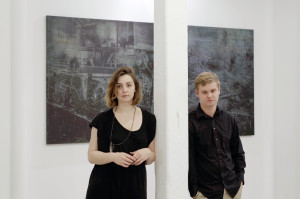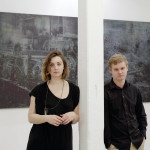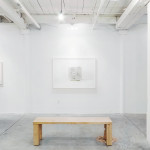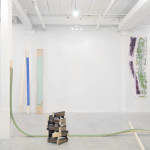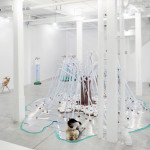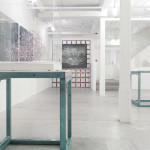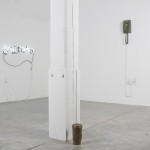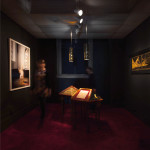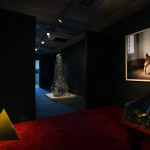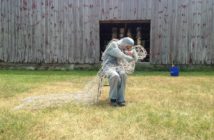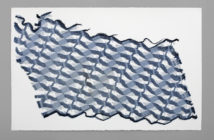"Boston Common" highlights the people and organizations that shape Boston and New England's cultural sector by going straight to the source to find out who they are, what they are doing, and how and why they do it. We hope that the interview series will champion some of the exemplary work being done, shed light on neglected issues facing our arts scene and community, build connections among individuals and organizations, and expand the networks on which we rely. In our newest installment, we talk to Corey Oberlander and Lindsey Stapleton of GRIN, a contemporary art gallery in Providence, RI founded in 2013 as a space for artists to develop and exhibit their work.
What is the mission of your organization? How does it serve its immediate and surrounding community?
Our mission is to exhibit and support emerging and underexposed artists who have a strong focus on concept and craft. We aim to present our artists' work within a steady curatorial program alongside a pseudo-museum-quality-presentation.
There aren't many spaces here doing what we are trying to accomplish, but there is a hungry creative community ready to support and be a part of something like GRIN. We are trying to set a high bar for emerging exhibition spaces and artists, with the hope that the independent arts economy will continue to grow along with us.
Tell us about your background: how does it equip you for your current job?
We both have backgrounds in fine arts, graduating from MassArt in Boston a handful of years ago. Perhaps our biggest qualification is that we’re both emerging artists and curators, hungry for places to exhibit own work, placing slightly beyond the café/restaurant opportunities. After being out of school for some time (and this goes back to the first question) we realized how difficult it can be to find and show in a space that holds its artists and its identity to a really high standard, while also being accessible. We realized we could offer that.
On a basic level, Corey is an event coordinator with a background in arts management, and Lindsey looks for needles in code-haystacks somewhere around the design world. Organization, developing clear processes, and navigating obstacles come naturally; those skill-sets have been pretty integral to keeping our doors open for the past two years.
We’re also really hard on ourselves. Guilt and accountability are perfect motivators, even/especially if they're self-imposed.
What are some of you/your organization’s recent accomplishments—how have you achieved your goals and how have you measured your success?
Being a part of SPRING/BREAK Art Show in New York City this past March was a big deal for us. We got to meet a lot of people from various positions in the art world—a number of whom we’ve been able to maintain lasting connections. The spirit of that event is completely in line with what we’re trying to do; it's thrilling to be a part of something on that scale.
For us, success is measured in a variety of different ways: living up to our standard, public interest, critical interest, and ultimately exposure for our artists. Getting a positive review, or into a fair or juried curatorial call can be validating. It’s good for our gallery and our artists. Steady peer support helps us as we try to reach higher and further with our programming. We’ve been fortunate enough to meet a number of exceptionally motivated and talented artists, and it's absolutely a success when someone we believe in wants to work with us on a project.
What are you working on now? Please tell us about the resources you need to complete your current project, and what challenges you’ve faced thus far.
Right now we’re very focused on expanding our program, both figuratively and literally.
We want to expose our artists to new audiences, new cities, new countries, and in various levels of the art world. This is to eventually include additional curatorial projects, art fairs, and digital exposure. This acts as a way to not only deliver our program and our artists to fresh eyes, but also an attempt to draw attention to Providence and the Greater Boston Area.
It’s been difficult to keep up financially with our current momentum. The brick-and-mortar operations are sustainable but application/participation fees, shipping costs, marketing and travel expenses are much more difficult to settle. The large-scale and installation work in our program doesn't lend itself to transport or travel. While "bringing the show on the road" is an important venture, it's not yet financially available or viable.
Time is also a limited resource.
It sometimes seems like we're sabotaging ourselves with our own standards; ambition and our inability to say 'no' to any opportunity.
What advice do you have for someone looking to follow in your footsteps? What do you wish you knew when you first started out?
Some of the cliches come to mind:
"Just do it." "Fake it 'till you make it." "If opportunity doesn't knock, build a door." "If you build it, they will come."
Be consistent. People will start to count on your schedule, and if you don't open your doors when they expect you to, they won't show up. Get in everybody's face and stay there. If need be, sacrifice creature comforts to ensure consistency.
"All things considered."
Presentation is of utmost importance, and it's imperative to consider every aspect of the business (beyond the exhibitions themselves), from wall paint finish, to the way you greet visitors, to the way you use social media. It all needs to be thought through.
What challenge(s) is the cultural sector in your community facing? How could it be alleviated or fixed?
We'll start with Providence as a whole because we firmly believe that the future of this city is held within a thriving and diverse arts and cultural community. This city has a ton of talent and potential, but it seems like we're only scratching the surface.
There is energy, intelligence and motivation in the people we meet in our city every day, but it seems that a lot of it is being channeled outside our city's limits.
Providence is a really wonderful place to experiment and find your way, as it’s affordable and offers an incredibly supportive, sometimes non-competitive community—but there isn’t a lot keeping people here once they find their personal footing. Providence has made itself a really wonderful stepping stone, but for many, it is not seen as a place to land. We think a lot of that comes from a lack of an arts driven economic industry, which is something people seem to be paying attention to lately.
We don't know enough about the economy here to bring anything new to the conversation, so we’ll talk about what’s directly effecting us and our peers, in our small existence. There is almost no critical validation and organization of the independent arts community here, and nothing placing it in a greater arts-world context. Locally, there are few steady critical reviews, editorials or listings of arts-related events (RIP Providence Phoenix), and a general lack of contemporary galleries. A well-documented and critically received art scene is one way for the rest of the art world to start paying attention to what we have to offer, and in turn, allow artists, galleries and collectors to start seeing Providence as a viable place to work, operate and patronize.
Tell us about one cultural event/exhibition or organization/individual (other than you or your organization) that has exceeded your expectations recently. What work are they doing, and why is it important?
We can't pick just one—can anyone?
As we mentioned, we were fortunate enough to be able to be a part of SPRING/BREAK Art Show this past March. SPRING/BREAK offers a wonderful opposite to the sometimes-stuffy, always-ostentatious experience of Armory Week in New York. There is no art-overlord running the show, it’s the passion project of two people, Andrew Gori and Ambre Kelly who bring hundreds of artists and curators together to shuffle the conversation. They have singlehandedly organized their own curator-driven art fair, featuring over 80 curators and some huge number of artists, in under-utilized spaces in Manhattan, for the last four years. This past year they expanded their program to include curators beyond the five boroughs, and it is not cost-exclusive. The projects involved come from the complete range of exhibitors, from established non-profit organizations to independent curators with no home-base. It was actually kind of touching to see the community they had built - a true one-for-all, all-for-one spirit that ran through the lot of us, while any individual successes could still be acknowledged and celebrated.
Liz Devlin is just the pinnacle of eager, authentic, exciting curatorial drive with her Isles Arts Initiative. Do we really need to go into how incredible that project is going to be?
Michael Shaw hosts a podcast called "The Conversation." On it, he talks with people from all over the art world, getting them to talk very candidly about what they know and their learning curve. He gets people like Lisa Schiff, William Powhida and Hrag Vartanian to talk about their thought processes and professional methods. It's informative and engaging, and well put together. Listening to those sorts of conversations are helpful, not only in that they explain some pretty significant why's and how-to's, but also because they widen the view of whats going on in the art world in a very honest way. Polished editorials and reviews are great, but these conversational interviews have unique personal insights included in them. It's nice to have thorough and thoughtful conversations like these being put out into the world on a consistent basis.
- Lindsey Stapleton and Corey Oberlander
- Installation- Standard Deviations by Sandra Erbacher
- Installation- Charlie Smith Making Unmaking by Charlie Smith
- Installation- Gibberish Sapient Fool’s Gold by Jeannie Lynn Hulen
- Current Installation- The Bluffs by Joseph Leroux, June 2015
- Installation- Standard Deviations by Sandra Erbacher
- Current Installation- The Bluffs by Joseph Leroux, June 2015
- Installation- Annulus at SPRINGBREAK featuring Jodie Goodnough, Steven Pestana and Leah Piepgras
- Installation- Annulus at SPRINGBREAK featuring Jodie Goodnough, Steven Pestana and Leah Piepgras


